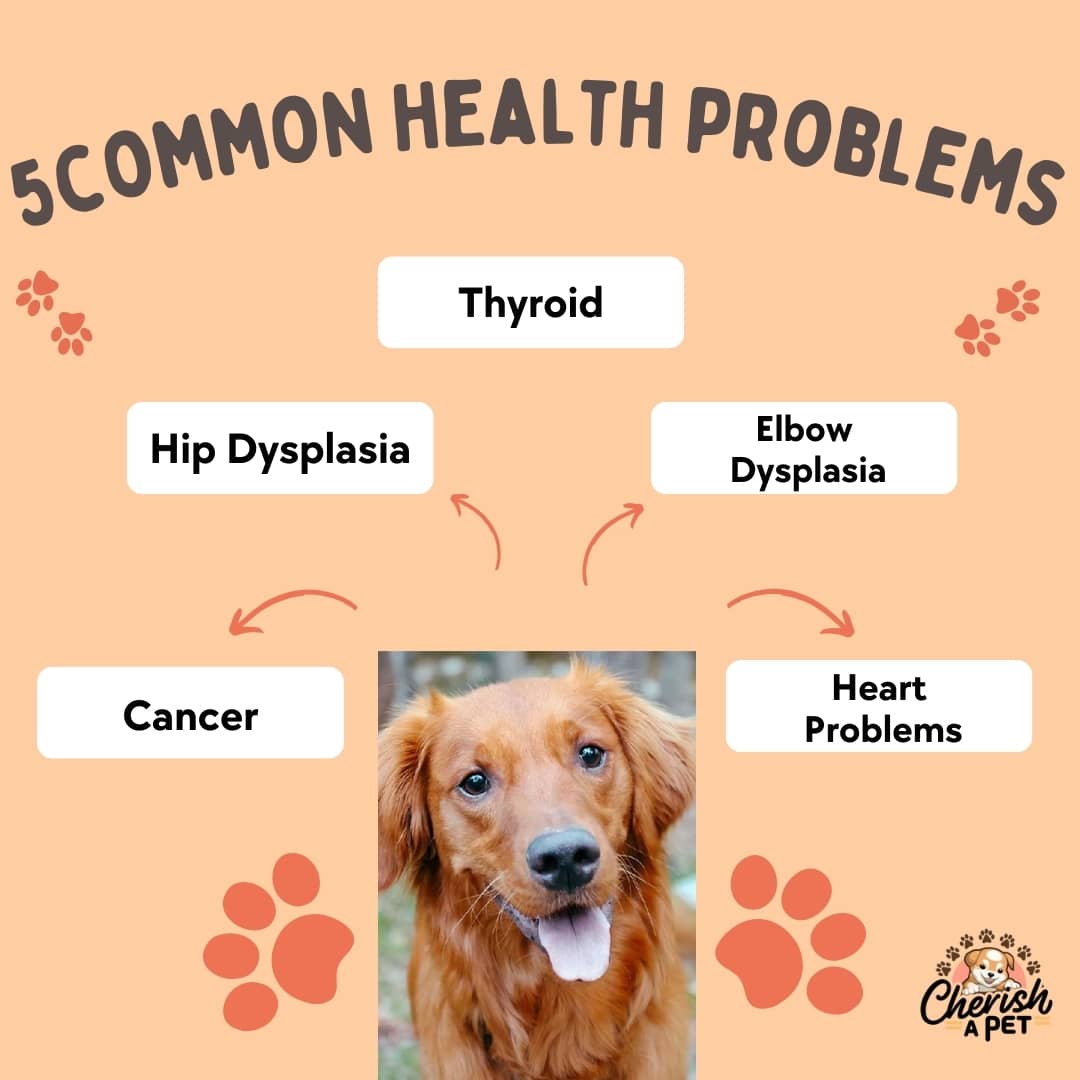Understanding the common health issues that Golden Retrievers face is the first step to ensuring they live long, happy, and healthy lives by our side. Those who have pets are the happiest and luckiest people. Golden Retrievers provide so much loyalty and joy to the families where they live. As they are dogs, they are prone to some health issues. They need to get free from these health issues to give them a healthier and happier life. For this, you must be aware of some 5 common Golden Retriever health issues that can arise anytime.

Health Issues With Golden Retrievers
There are 5 common golden retriever health issues that you need to be aware of to give your golden retriever a healthier and happier life.
- Hip Dysplasia
- Elbow Dysplasia
- Cancer
- Heart Problems
- Thyroid Problems
Hip Dysplasia in Golden Retrievers
Hip dysplasia is one of the most common golden retriever health issues. It can cause pain, discomfort, and reduced mobility in your pup. Hip dysplasia is a condition in golden retrievers where the hip joint does not form correctly. The hip joint works like a ball and socket, but the ball doesn’t fit snugly into the socket in dysplasia. This causes the joint to rub and grind instead of moving smoothly, leading to joint damage, pain, and arthritis over time.
Signs of Hip Dysplasia
- Difficulty getting up or lying down.
- Limping or hopping like a bunny when running.
- Avoiding stairs or jumping.
- Stiffness, especially after exercise.
Genetics plays a major role in the development of hip dysplasia, but factors like rapid growth during puppyhood and obesity can worsen the condition. To manage hip dysplasia, keep your Golden Retriever healthy, moderate exercise regularly, and feed a balanced diet. Provide them with regular vet check-ups to improve the mobility of your golden retrievers.
Elbow Dysplasia in Golden Retrievers
Elbow dysplasia is another orthopedic issue that affects Golden Retrievers. It involves improper development of the elbow joint. This condition typically involves bone misalignment or cartilage abnormalities that cause the bones of the elbow to rub together. It leads to inflammation, pain, and arthritis.
Signs of Elbow Dysplasia
- Limping on one or both front legs.
- Stiffness, especially after playing.
- Swollen elbows or difficulty bending them.
- Avoiding activities like running or playing fetch.
For hip dysplasia, genetics is a primary cause, but rapid growth and excess weight can also be the reasons for this problem. To manage elbow dysplasia, it is important to provide your golden retriever with low-impact exercise, maintain their weight, and consider joint supplements or medications recommended by a veterinarian. In severe cases, you need to go for surgical intervention to improve joint function.
Cancer
Cancer is a common health issue in golden retrievers; they can have cancer like the other dog breeds. It is a very serious problem, and it can occur to your retrievers at any age. You need to be careful with their every sign and take care of your pet. If you early detect the signs of cancer, you can stop this issue from becoming worse.

Signs of Cancer in Golden Retrievers
- Sudden weight loss
- Lumps, bumps, or discolored skin
- Loss in appetite
- Wounds/Sores that are not healing
- Abnormal/bad odor from the mouth/feces
- Difficulty in breathing and eating
- Extreme lethargy
- Lameness
If you see any of these signs in your golden retrievers, you need to visit your vet immediately.
Common Types of Cancers in Golden Retrievers
Golden retrievers are predisposed to some common types of cancers, i.e., lymphosarcoma, mast cell tumors, hemangiosarcoma, and osteosarcoma.
Lymphosarcoma in Golden Retrievers
Lymphosarcoma, also known as lymphoma, is a common cancer in Golden Retrievers that affects the lymphatic system, including lymph nodes, spleen, liver, and bone marrow. This type of cancer can cause swelling of the lymph nodes, weight loss, lethargy, and loss of appetite. While the exact cause is unknown, genetics are thought to play a role. Treatment often involves chemotherapy, which can be highly effective in extending the dog’s quality of life. You need to keep the signs in mind to treat this early.
Mast Cell Tumors in Golden Retrievers
Mast cell tumors are a type of skin cancer that can appear as lumps or growths on or under the skin. These tumors are made up of abnormal mast cells, which are part of the immune system. Mast cell tumors can vary from benign to highly aggressive. Symptoms may include itching, redness, swelling, or gastrointestinal issues if the tumor releases histamines. Surgery is the most common treatment, and in some cases, chemotherapy or radiation may be needed to prevent recurrence or manage aggressive tumors.
Hemangiosarcoma in Golden Retrievers
Hemangiosarcoma is an aggressive cancer that originates in the blood vessels and often affects the spleen, liver, or heart. It is especially dangerous because it can remain undetected until it causes life-threatening internal bleeding. Symptoms may include weakness, collapse, pale gums, and a swollen abdomen. This cancer is more common in Golden Retrievers than in many other breeds. Treatment options include surgery to remove the affected organ and chemotherapy, but the prognosis is often guarded due to the aggressive nature of the disease.
Osteosarcoma in Golden Retrievers
Osteosarcoma is a bone cancer that most commonly affects the legs of Golden Retrievers. This cancer is very aggressive and often spreads to the lungs and other parts of the body. Symptoms include lameness, swelling, and pain in the affected limb. Treatment usually involves amputation of the affected limb followed by chemotherapy to slow the spread of the disease. While osteosarcoma is serious, early diagnosis and treatment can improve the dog’s quality of life and potentially extend their survival time.
Heart Problems
There are 2 common golden retriever heart problems, i.e., dilated cardiomyopathy (DCM) and subvalvular aortic stenosis (SAS).
Dilated Cardiomyopathy (DCM)
Dilated cardiomyopathy (DCM) is a heart condition in which the heart’s muscle weakens and becomes enlarged, making it harder for the heart to pump blood effectively. This can lead to symptoms like lethargy, coughing, difficulty breathing, and fainting. DCM is often linked to genetics or nutritional issues, such as a deficiency in taurine, an essential amino acid. Treatment typically includes medications to support heart function, diuretics to manage fluid buildup, and dietary supplements like taurine if needed. Early diagnosis and ongoing care from a veterinarian can help improve a Golden Retriever’s quality of life.
Subvalvular Aortic Stenosis (SAS)
Subvalvular aortic stenosis (SAS) is a genetic heart defect commonly seen in Golden Retrievers. It occurs when there is a narrowing just below the aortic valve, which obstructs blood flow from the heart to the rest of the body. This condition can put extra strain on the heart, leading to symptoms like fainting, weakness, exercise intolerance, or even sudden death in severe cases. Mild cases may not show noticeable symptoms. SAS is usually diagnosed through a heart murmur during a vet check-up, confirmed by imaging tests. Treatment options include medications to reduce heart strain, but there is no cure, so regular monitoring and avoiding strenuous activity are essential.
Thyroid Problems
Your golden retrievers can experience thyroid issues as well. They include Hypothyroidism and Hyperthyroidism. Hypothyroidism in golden retrievers is very common, but Hyperthyroidism in golden retrievers is rare, though it happens.
Hypothyroidism in Golden Retrievers
The most common thyroid problem in Golden Retrievers is hypothyroidism. It occurs when the thyroid gland doesn’t produce enough thyroid hormones, which are essential for regulating metabolism. Symptoms of hypothyroidism include weight gain, lethargy, hair loss, a dull coat, and cold intolerance. Affected dogs may also develop skin infections or become less active and sluggish. This condition is often caused by autoimmune diseases or the natural shrinking of the thyroid gland. Fortunately, hypothyroidism is easily managed with daily thyroid hormone replacement medication. It will allow your dogs to live normal, healthy lives.
Hyperthyroidism in Golden Retrievers
Hyperthyroidism, though rare in Golden Retrievers, happens when the thyroid gland produces too much thyroid hormone, speeding up the metabolism. This condition is more common in cats but can occur in dogs due to thyroid tumors. Symptoms include weight loss despite a good appetite, hyperactivity, increased thirst and urination, and a rapid heart rate. Treatment depends on the cause and may include surgery to remove the tumor, radiation therapy, or medications to control hormone production. Proper vet care is important if you want your golden retrievers to stay healthy and prevent thyroid problems.
Eye Problems
There are certain eye problems in golden retrievers like cataracts, progressive retinal atrophy (PRA), entropion, distichiasis, and glaucoma.
Cataracts in Golden Retrievers
Cataracts in Golden Retrievers are a common eye problem, where the eye’s lens becomes cloudy, impairing vision. This condition can develop due to genetics, aging, or as a result of other health issues like diabetes. Affected dogs may show signs such as difficulty seeing in low light, squinting, or bumping into objects. In severe cases, cataracts can lead to blindness. If cataracts are causing significant vision problems, immediate surgery to remove the cloudy lens is recommended. This can often restore vision, allowing the dog to lead a normal life.
Progressive Retinal Atrophy (PRA) in Golden Retrievers
Progressive retinal atrophy (PRA) in Golden Retrievers is a genetic condition that causes the gradual degeneration of the retina. Over time, PRA leads to a decline in vision, starting with night blindness and progressing to total blindness. Symptoms are usually subtle at first, with affected dogs struggling to see in dim light or being hesitant in unfamiliar surroundings. There is no cure for PRA, but affected dogs can still lead happy lives with proper care. Early diagnosis can help manage the condition. Dogs with PRA often adapt well to their vision loss by using other senses to navigate.
Entropion in Golden Retrievers
Entropion in Golden Retrievers is a condition where the eyelids roll inward, causing the eyelashes to rub against the surface of the eye. This leads to irritation, redness, excessive tearing, and potential damage to the cornea. Entropion can be inherited or develop due to aging or injury. Affected dogs may squint or paw at their eyes in discomfort. Treatment typically involves surgery to correct the eyelid position and prevent further irritation. Therefore early treatment is necessary to avoid long-term damage to the eyes.
Distichiasis in Golden Retrievers
Distichiasis in Golden Retrievers is a condition where extra eyelashes grow along the edge of the eyelid. It irritates the cornea and conjunctiva. These extra lashes can scratch the surface of the eye, leading to discomfort, redness, and watery eyes. In some cases, it can result in more severe eye damage. Treatment may involve removing the extra lashes, either through surgery or other procedures like cryotherapy or electrolysis, to prevent further irritation and protect the eye. You need to regularly monitor their condition.
Glaucoma in Golden Retrievers
Glaucoma in Golden Retrievers is a serious eye condition characterized by increased pressure within the eye. It can cause pain, damage to the optic nerve, and ultimately blindness if not treated. Symptoms may include red eyes, squinting, a cloudy appearance to the eye, and behavioral changes like sensitivity to light or a decrease in activity. Glaucoma can develop suddenly or over time, and the condition is often genetic. Treatment for glaucoma typically involves medication to reduce intraocular pressure, and in severe cases, surgery may be needed to save the dog’s vision.
How to Prevent Golden Retriever Health Issues?
Preventing health issues in Golden Retrievers involves proper care and regular attention to their physical, mental, and emotional well-being. Here are some tips to help reduce the risk of common golden retriever health issues:
- Regular Vet Check-Ups
- Proper Balanced Diet
- Regular Exercise
- Weight Management
- Grooming and Hygiene
- Genetic Screening
- Joint and Bone Care
- Dental Care
- Mental Stimulation
- Preventive Medications
Frequently Asked Questions
Question 1: What disease is most common in Golden Retrievers?
Answer: The most common health issue in Golden Retrievers is hip dysplasia. This genetic condition affects the hip joint, causing pain, arthritis, and mobility issues as the dog ages. Golden Retrievers are also prone to cancer, with lymphoma and hemangiosarcoma being some of the most common types.
Question 2: What is the main cause of death of Golden Retrievers?
Answer: The leading cause of death in Golden Retrievers is cancer. They are particularly prone to certain types of cancer, such as lymphoma, hemangiosarcoma, and osteosarcoma. These aggressive cancers often develop later in life, leading to a significant decline in health.
Question 3: What is the lifespan of a Golden Retriever?
Answer: The average lifespan is around 10-12 years, but many Golden Retrievers live into their teens, especially when they receive regular veterinary check-ups, a balanced diet, and plenty of exercise.
Question 4: Do Golden Retrievers face some health issues related to the brain?
Answer: Golden Retrievers are at risk of canine cognitive dysfunction syndrome (CDS), which is similar to Alzheimer’s disease in humans. CDS leads to confusion, memory loss, and changes in behavior, such as disorientation and anxiety. This is more common in older dogs, and while it can’t be cured, treatments can help manage the symptoms.
Question 5: What are the blood disorders in Golden Retrievers?
Answer: Golden Retrievers can suffer from von Willebrand’s disease, a hereditary bleeding disorder that affects blood clotting. Symptoms include excessive bleeding from minor injuries or surgery. Immune-mediated hemolytic anemia (IMHA), where the immune system attacks the red blood cells, is another blood disorder that can affect Golden Retrievers.




